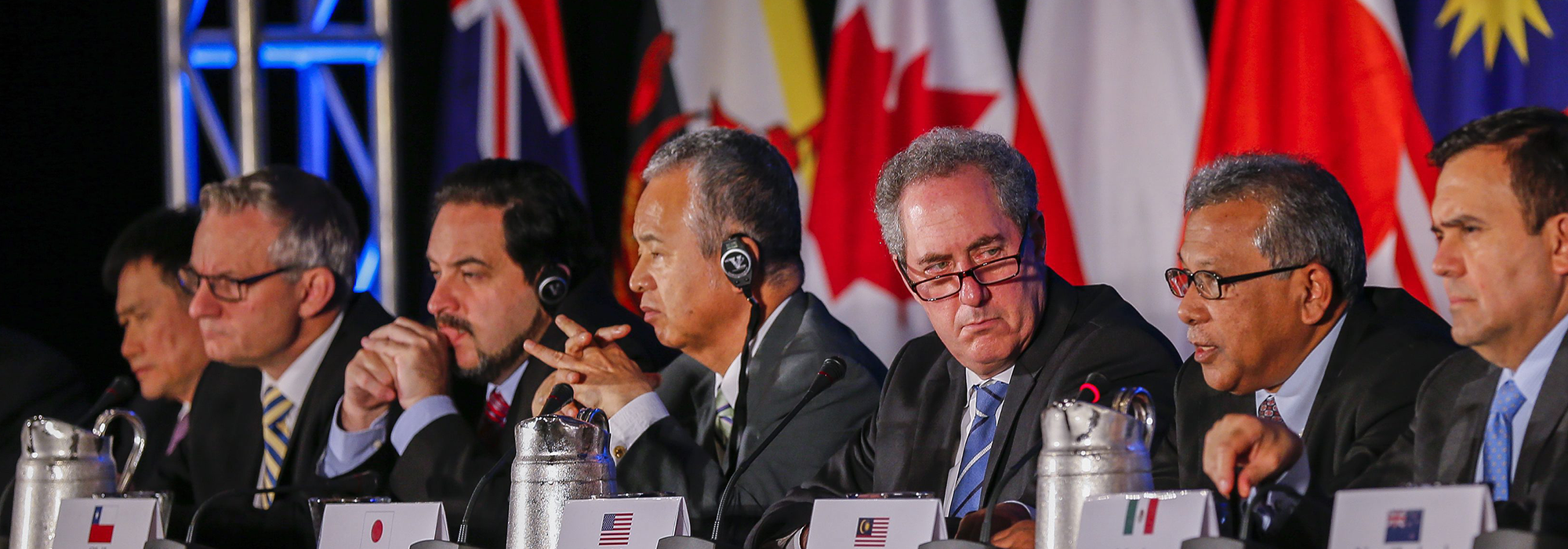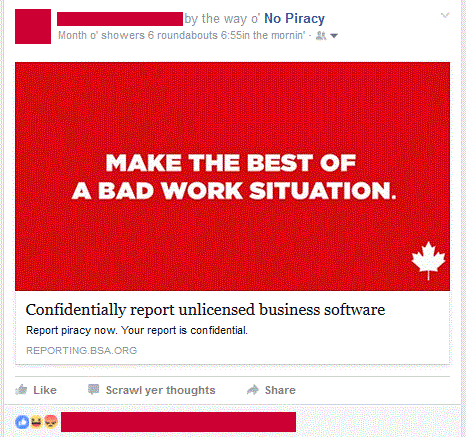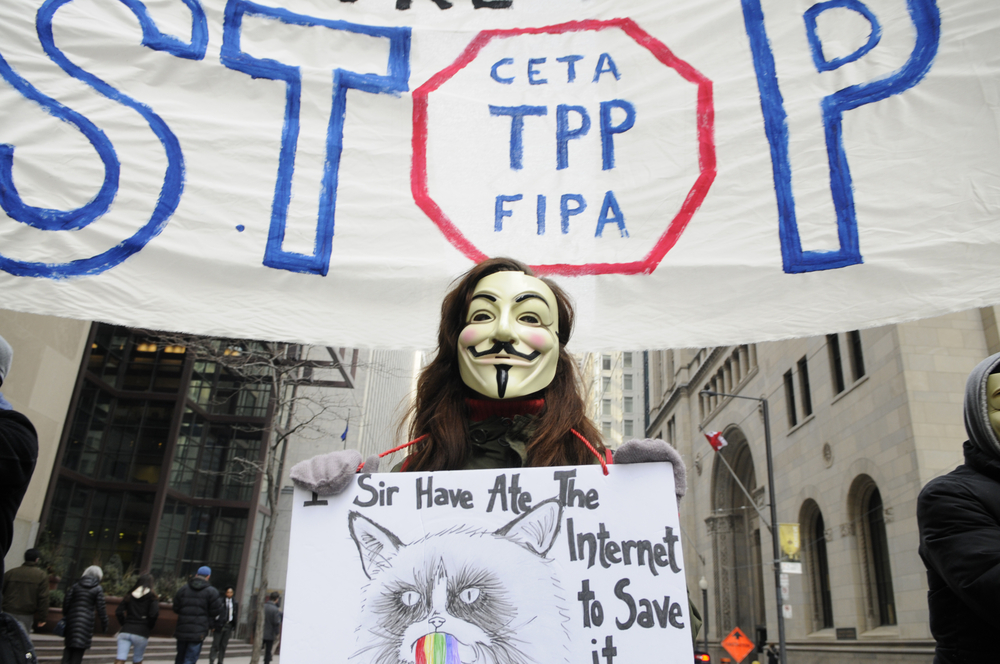
While scrolling through the deluge of #ExamStruggle statuses in my Facebook news feed, a post that was shared from a page called No Piracy caught my attention. For added effect, I changed my Facebook language settings to “Pirate English” before snapping a screenshot (yes, this setting actually exists).
No Piracy is an initiative of the trade group “The Software Alliance”, which lobbies on behalf of software companies and developers around the globe for better protection of intellectual property rights. They hold that intellectual property “is a critical driver of technological innovation”, and that “patents, copyrights, trademarks, and other IP rights should be comprehensive and enforceable” … so naturally, software piracy is a big no-no to them.
Allow me to sum up what No Piracy is trying to do with this ad campaign. They’re asking Facebook users to report suspected use of unlicensed (a.k.a. pirated) software at their workplaces. Facebook’s new “haha” and “angry” emoji reactions do a good job of capturing the futility and danger of what No Piracy is asking Canadians to do.
Pirated software is essentially a carbon copy of the intended program. Asking people to spot the difference themselves is bound to result in a number of false accusations and unwarranted legal troubles for many law-abiding business owners.
Legitimate reports of unlicensed business software probably won’t come from individuals who have “seen the light.” They’ll probably come from disgruntled employees who care more about “sticking it to the man” than sticking up for programmers. Furthermore, at no point does the complaint form ask for information that can be used to actually prove that you work at the company you’re filing the complaint against. Most of the information they ask for can be found any company’s website or LinkedIn page, meaning anyone can potentially put a company through the costly process of defending themselves against false accusations in court.
Intellectual property theft is not a “slap on the wrist” crime in the eyes of the law. It can lead to serious consequences, with serious players (like The Software Alliance) spending serious money to have governments take action.
The maximum fine for illegal downloading in Canada is currently set at $20,000. Greater harmonization with U.S. law could easily see this figure rise into the six figures. Canadians have been exposed to legal threats since Ottawa introduced the “notice-and-notice” copyright system in 2015. Under the rules, copyright owners who notice infringement online have the power to contact the “pirate” via their Internet service provider and send them a notice requesting that they take down or uninstall the content. As reported by Michael Geist in his blog, Canadians have already begun receiving copyright infringement notices from American companies warning them that they might be liable for penalties of up to $150,000 per infringement.
Fortunately, these estimates are based off U.S. law, which happens to not apply in Canada. However, should the Liberals ratify the Trans-Pacific Partnership (TPP), foreign companies would have greater means to penalize Canadians for copyright infringement.
One of the most controversial elements of the TPP is the fact that foreign companies — through so-called Investor-State Dispute Settlement tribunals — will be able to sue governments over actions which undermine their profits. The American private sector has shown a strong and well-funded willingness to protect its intellectual property through political means in the past. These tribunals will make Canada the latest hunting ground of the strongest private anti-piracy coalition in the world; a coalition that will be more than willing to use its TPP-backed legal leverage to make sure the Canadian government maintains its commitment to intellectual property rights.
So what are our policy options?
First, Canada should pass on ratifying the TPP. The deal is a Pandora’s Box, with the crackdown on software piracy being just one of the many things that risks evolving beyond our control. Signing a deal that radically enhances an organization’s ownership over information would be a major misstep for a government that holds such a progressive stance on access to information. Access to information lies at the heart of the Internet. Being able to openly share, discuss, and criticize information online has had immeasurable cultural impact… pushing society’s collective creative capacity to previously unreachable limits. The cultural productions of the Internet – from open source software to your favorite meme – constantly challenge the notion any one idea can be owned in the context of the web. Being complicit in a deal that will compromise such a powerful engine for innovation is unacceptable.
Second, rather than enhancing the ability to penalize Canadians for pirating software, the federal government should instead make software more affordable for Canadians to purchase legally. Subsidies for Internet connection already exist for Canadians, so why not software? Making software more affordable would have the dual effect of increasing the skill level of Canadians while supporting local software manufacturers. The sooner the government recognizes these costs as educational barriers, the better.
Canadians need to move passed the “greasy teen downloading music off of Napster” image of piracy. The anti-piracy coalition is stronger than ever before, and is finding increasingly innovative ways to track down offenders and have them punished in the court of law. We’re entering an increasingly borderless world for intellectual property law, and Canada is likely in for a culture shock.
Photo: THE CANADIAN PRESS / Erik S. Lesser
Photo: arindambanerjee / Shutterstock.com
Do you have something to say about the article you just read? Be part of the Policy Options discussion, and send in your own submission. Here is a link on how to do it. | Souhaitez-vous réagir à cet article ? Joignez-vous aux débats d’Options politiques et soumettez-nous votre texte en suivant ces directives.








